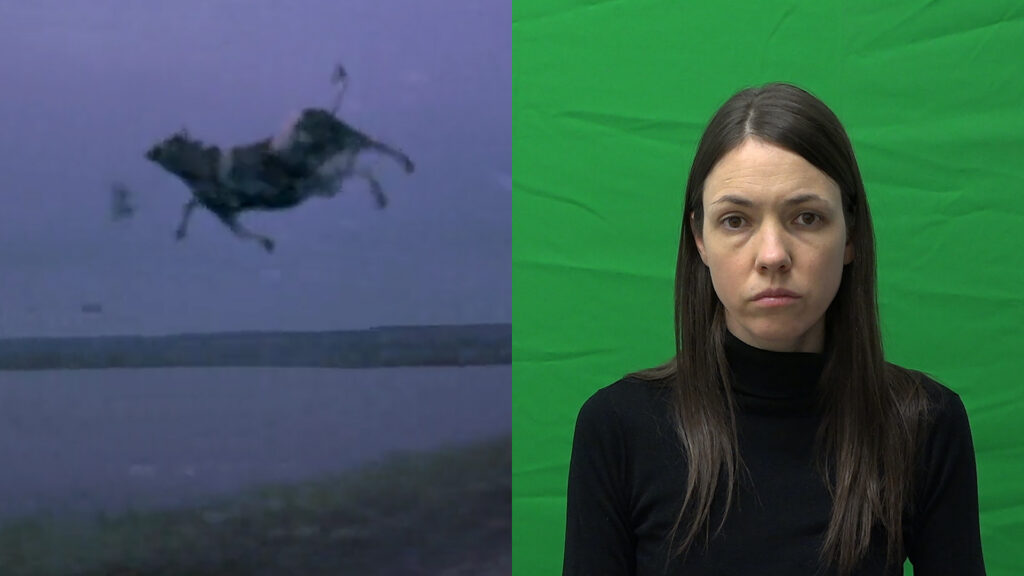Les quatre récits d’Alice

5:45 min | 2020
Festivals
01/2020: International Film Festival Rotterdam, Netherlands (Found Footage Award Nominee)
03/2020: Rendez-vous Québec Cinéma, Canada (Best Short Film Art and Experimentation Competition)
03/2020: Rencontres Internationales Traverse Video, Toulouse, France
09/2020: Bureau des Questions Importantes, EEEEH! La Grenette, Nyon, Switzerland
09/2020: Open City Documentary Festival, London, United Kingdom
10/2020: Festival des Cinémas Différents et Expérimentaux, Paris, France (International Competition)
10/2020: Uppsala Short Film Festival, Uppsala, Sweden (International Competition)
10/2020: DOK Leipzig, Germany (International Competition Short Film)
11/2020: Message to Man, St.Petersburg, Russia (In Silico International Competition of Experimental Films)
12/2020: This Human World, Vienna, Austria (Exp:an:ded Shorts Competition)
07/2021: Festival ECRÃ, Rio de Janeiro, Brazil (Instalações e Artes Interativas)
10/2021: Lucca Film Festival e Europa Cinema, Italia (Selezione Ufficiale Cortometraggi)
10/2021: Tallinn Photomonth, Estonia (Artists Film Programme Diplopia)
11/2021: Festival Internacional de Videoarte de Camagüey, Cuba
11/2021: Istanbul International Experimental Film Festival, Turkey (Competition Memory Boom)
09/2022: Braquage association, Paris, France (Program De la ventriloquie)
10/2022: e-flux Video & Film, Brooklyn, New York, United States (Program 1.Tongue Takeover)
06/2023: Festival de l’histoire de l’art, The Climat, Fontainebleau, France
09/2024: IN SITU, La lumière collective and OK LÀ!, Montréal, Canada
12/2024: FRAC Champagne-Ardenne, Reims, France
Awards
10/2020: Jury Prize, Festival des Cinémas Différents et Expérimentaux de Paris, International competition
11/2020: Centaur Prize for Best Experimental Film, In Silico International Competition of Experimental Films, IFF Message to Man
« Alice’s memories are the occasion for an ambiguous examination of the representation of traumatic events, with collective and individual representations of perception. Testimony versus “prosthetic memory”: The director dubs the sound recordings of her grandmother, collected over a period of ten years, in which the old lady recaps her encounter with a tornado as a child, in front of a green screen. While the details of her memories change through repeated narration over time, the found footage from feature and disaster films, weather reports and landscape images suggests a mediatised participation in the events. »
— Borjana Gaković (Dok Leipzig)
« In Les quatre récits d’Alice, Myriam Jacob-Allard explore a story which, because of its persistence, is part of the family lore. This story, told countless times by her grandmother, is an implausible tale of the time a hurricane worthy of The Wizard of Oz, when she was a child, picked her up and sent her flying.
The video, whose pictures are split into two, show images documenting tornados and hurricanes on one side, taken from the internet or from disaster films, and the artist reading a weather forecast against an amateurish green background on the other side. Here Jacob-Allard lip synchs a story told by her grandmother. A montage/collage of images to her left flows past to illustrate the story. The visual codes of the television weather forecast quickly become secondary to four different versions of her grandmother’s story, which Jacob-Allard recorded over a ten-year period. Over the years, the story changes. The key points remain but the sequence of events differ and, curiously, the more time that passes, the further back the story goes, with her grandmother saying she was fourteen, then thirteen, twelve and eleven years old. Les quatre récits d’Alice, in its many offshoots, becomes a kind of essay on memory, passing on and belonging. By repeating the various versions of Alice’s tale, Jacob-Allard makes the story her own. This appropriation is embodied in her lip-synching, as she becomes detached, so demanding does that act of carrying it out appear. This distance speaks to the subjectivity of memory—somewhat like her grandmother distancing herself more and more from the time of her own story, modifying it along the way— as well as to the need for moorings when constructing one’s identity and for a desire to free oneself in order to evolve. »
— France Choinière (Clerval vallée claire ou claire vallée, T’envoler, Dazibao)
Voice: Alice Gervais
Lip-sync: Myriam Jacob-Allard
Sound recording : Claire Jacob et Myriam Jacob-Allard
Mixer and sound editing : Bruno Bélanger (PRIM)
Colorist : Sylvain Cossette (PRIM)
Camera and editing : Myriam Jacob-Allard
Distribution: Collectif Jeune Cinéma
For their support in this project, the artist would like to thanks: Alice Gervais, Claire Jacob, Simon Plouffe, Émilie Jacob-Allard, Denis Allard, Nicholas Larouche, France Choinière, Jean-Philippe Thibault, Victoria Stanton, la Société d’histoire du patrimoine de La Sarre, le Conseil des arts du Canada, le Conseil des arts et des lettres du Québec, PRIM.